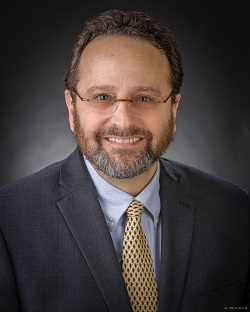09/21/2020
Hospitalized for the High Holy Days
- Share This Story
Six Tips to Show You Care
by Rabbi Eddie Sukol

Eddie Sukol is a chaplain for the Jewish Federation of Cleveland, a program supported by the annual Campaign for Jewish Needs, that comforts members of the Jewish community in hospitals, nursing homes, the military and prisons through correspondence and visits. He is the rabbi of The Shul, Cleveland’s Open Synagogue.
Rosh Hashanah and Yom Kippur, the Yamim Noraim, are a time of heightened Jewish connection. Jews of all backgrounds, all beliefs, and all styles of observance, feel an intensity, a quickening of our Jewish pulse. We gather with family and friends at home and at synagogue. We share blessings, prayers, and meals. We come together as a community.
These pandemic days have brought with them many disappointments, frustrations, and losses. We will not be gathering as we normally do. Meals with the extended family will be reduced to immediate family only. Holiday worship will be online or in very small groups. The community will be together spiritually, but not physically. This will be a year like no other.
For a person in the hospital, the pandemic has made it even more of an anxious and fearful time. The faces of physicians, nurses, and other caregivers are hidden behind masks, making the patient’s experience less personal, less comforting, and less reassuring.
The hospital setting compounds a patient’s unease. The lack of fresh air and sunlight, the interrupted sleep, the incessant buzzes and beeps of the medical equipment, the ever-present artificial light, all contribute to a patient’s loss of control over their body and their environment.
All of these feelings are intensified during the holidays because a hospitalized person is separated from family and friends. The pandemic exacerbates this hardship because hospitals have restricted visitation by family members, usually permitting only one designated relative to visit. No friends may visit. Patients may feel more isolated and more alone during the holidays because of what they feel they are missing.
These are difficult days. Yet there are things we can do to make it better for our hospitalized family members and friends.
- Make a connection by calling, or even better by using an app that allows you to make both a video and audio connection. Technology is particularly useful right now.
- When you talk, let the patient set the tone and topic for your conversation. There’s a good chance they won’t want to talk about their medical status. Follow their lead.
- Keep calls brief. Don’t expect to talk or video visit for very long. Remember a person is in the hospital because their health is compromised. The value of the call is in the connection made, not the length of time spent on the phone.
- Send cards to anyone who is going to be hospitalized for more than a few days. Colorful cards with comforting messages lift a person’s spirits. It makes them feel remembered and cared for. Don’t underestimate its impact. If the patient has young grandchildren have them draw or write something and include that with the card.
- Ask the patient if they would like to be included in a local synagogue’s mishebeirach (prayer) for health. Many people find comfort in being remembered by their community and having a prayer offered on their behalf. Prayer may not cure disease but it does heal the soul.
- Finally, do not forget about the family of the hospitalized person. If a patient has a spouse, partner, parents, siblings, or children, reach out to them to offer them your support and comfort. This is a hard time to have a beloved family member in the hospital. The patient’s family will appreciate your care and concern.
As with anyone, in or out of the hospital, end your conversations on a positive and hopeful note. It is always appropriate during these holidays to wish someone a sweet New Year.


Comments